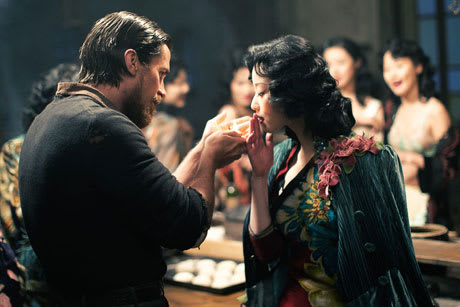It's no surprise that the latest offering from Zhang Yimou (the man behind the 2008 Beijing Olympics opening and closing ceremonies, who also directed Hero and House of Flying Daggers) is a visual wet dream. It's also no surprise that amidst the meticulously framed shots of war-torn Nanjing during the 1937 massacre and haunting slow motion imagery of death and explosions there is virtually no complex or believable humanity beyond that of broad clichés and superfluous, interchangeable characters motivated only by the necessity of plot progress and conflict.
The titular flowers refer to a group of Catholic schoolgirls hiding out in a church, as well as a number of whores that seek refuge in the cellar of said church while wartime brutality and excess rape marches on around them. Protecting these groups is reluctant antihero John (Christian Bale), whose initial monetary cynicism as a mortician flips inexplicably to goodwill protector once he dons clerical clothing and poses as a priest. In an effort to sell this change of heart, John falls in love with one of the whores (Ni Ni), defined mainly by her lot as a good schoolgirl turned dirty after a childhood rape.
Despite the worn narrative tropes, Yimou does treat the conflict with dignity, capturing the painful pointlessness of it all with images of men sacrificing themselves to blow up a tank, only to have another tank emerge from the smoke behind it. Similarly, the harsh vulgarity of rape is handled without gratuity, even though a pivotal, nauseating scene of a hooker being tied up, gang-raped and eventually stabbed to death singlehandedly makes The Flowers of War a challenge to watch unaffected.
It's just unfortunate that this mature handling of historical horror doesn't entirely mesh with the more intimate mishmash of the story at the core, wherein Japanese officers request the presence of the Catholic schoolgirls at a social function of sorts (one where rape and murder are surely the main course). The moral implication that the whores, who are ultimately asked to substitute for the girls, are less valuable human beings is vague and shady at best, as is the persona of the incidental narrator and her random exposition about peripheral characters. (Why are we supposed to care about her father anyways?)
Somewhere in here is a gorgeous movie about the victims, or flowers, of war, but Zhang Yimou is far too preoccupied with making everything look pretty to know where exactly that great movie might be.
(eOne)The titular flowers refer to a group of Catholic schoolgirls hiding out in a church, as well as a number of whores that seek refuge in the cellar of said church while wartime brutality and excess rape marches on around them. Protecting these groups is reluctant antihero John (Christian Bale), whose initial monetary cynicism as a mortician flips inexplicably to goodwill protector once he dons clerical clothing and poses as a priest. In an effort to sell this change of heart, John falls in love with one of the whores (Ni Ni), defined mainly by her lot as a good schoolgirl turned dirty after a childhood rape.
Despite the worn narrative tropes, Yimou does treat the conflict with dignity, capturing the painful pointlessness of it all with images of men sacrificing themselves to blow up a tank, only to have another tank emerge from the smoke behind it. Similarly, the harsh vulgarity of rape is handled without gratuity, even though a pivotal, nauseating scene of a hooker being tied up, gang-raped and eventually stabbed to death singlehandedly makes The Flowers of War a challenge to watch unaffected.
It's just unfortunate that this mature handling of historical horror doesn't entirely mesh with the more intimate mishmash of the story at the core, wherein Japanese officers request the presence of the Catholic schoolgirls at a social function of sorts (one where rape and murder are surely the main course). The moral implication that the whores, who are ultimately asked to substitute for the girls, are less valuable human beings is vague and shady at best, as is the persona of the incidental narrator and her random exposition about peripheral characters. (Why are we supposed to care about her father anyways?)
Somewhere in here is a gorgeous movie about the victims, or flowers, of war, but Zhang Yimou is far too preoccupied with making everything look pretty to know where exactly that great movie might be.




